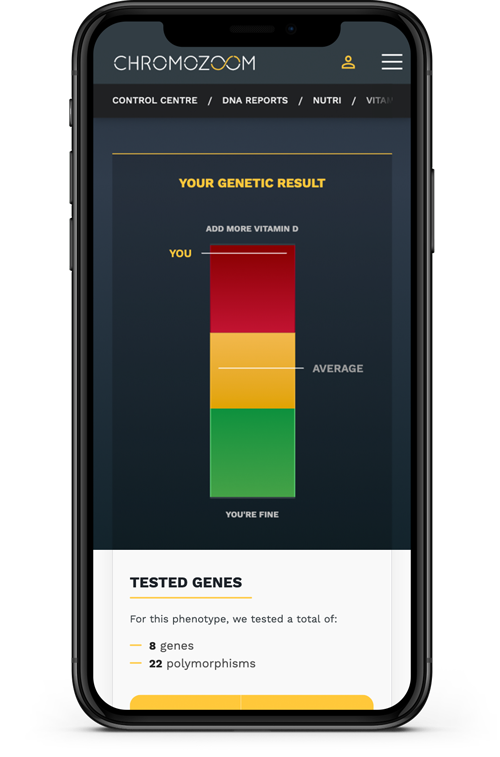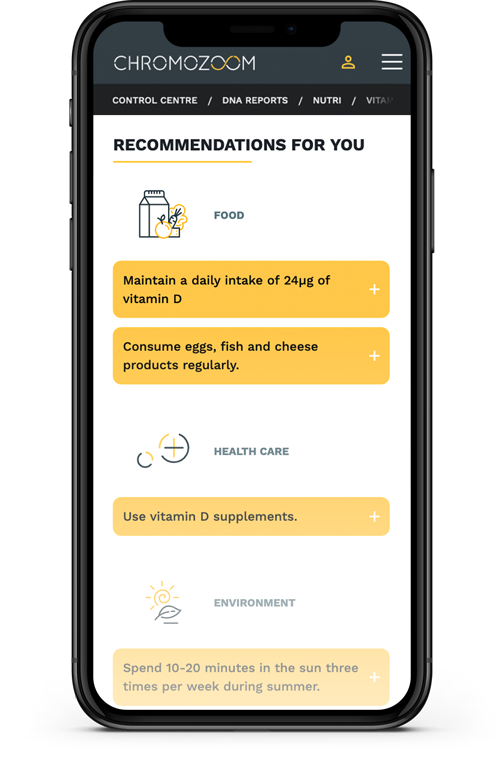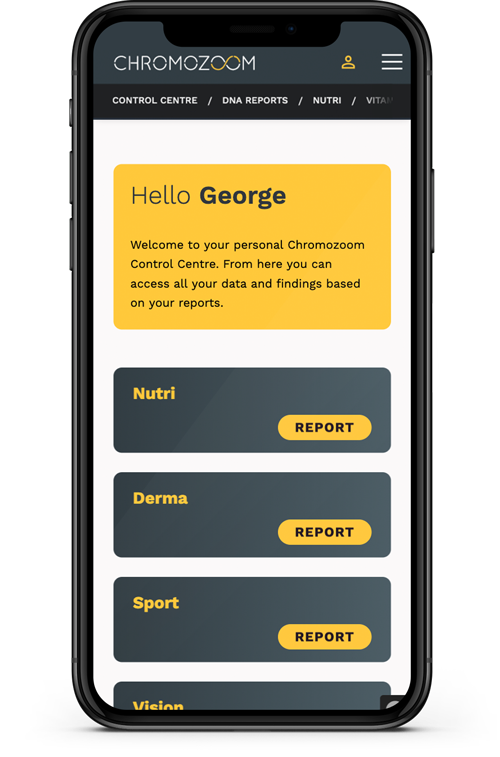Request a DEMO
If you are interested in our product, request access to demo account here. Leave us your email and you will receive login information.

Optimise your nutrition with ChromozoomBeauty

One word appears repeatedly in genetics – nutrition. We are used to discussing it in relation to dental care or sports, but nutrition influences much more, including our appearance. Through personalised dietary advice, you can improve the antioxidant capacity of your skin.

ChromozoomBeauty
Some people have the genes for acne. In this report, you’ll discover what’s behind your breakouts – is it your genes, your environment or lifestyle? For genetically linked acne, we advise on how to curb sebum production. If your acne is caused by lifestyle, we’ll suggest ways to limit triggers such as cigarette smoke and stress.
Find out if your genes make the capillaries on your face prone to dilating – so causing rosacea flare ups. To avoid flare ups, we’ll highlight various trigger foods you can avoid, and other irritants.
Some people get dry skin because their skin is thinner due to their genes. If your DNA test predicts thin skin, we will suggest ways to strengthen your skin’s natural barrier. Discover which creams, specifically, you should use and which foods can support your skin
Varicose veins tend to run in families because of a genetic tendency to weakened vein walls. If you are at genetic risk, we will advise you which supplements could support vein health. But if your varicose veins are caused by lifestyle, we will suggest managing risks. Lack of movement, trauma to the leg, high progesterone levels, smoking and being overweight are all possible contributors to varicose veins.
In this report, we’ll identify your genetic risk of cellulite, risk factors, and which ingredients in skin creams will best suit you. Adding the right foods and drinks to your diet can improve your cellulite, or help prevent it altogether.
Once stretch marks form, they’re here to stay – and creams can only fade them. To find out if you’re genetically prone to stretchmarks, we will look for variations in your DNA linked to easily torn elastin fibres in your skin. Which cream is best for preventing stretch marks? Explore advice designed to limit your personal risk and ensure healthy, attractive skin for the long term.
Sunlight or UV radiation causes most cases of prematurely aged skin. How much the sun affects your skin depends largely on your melanin types and levels. And these are determined by your genes.
This report will reveal whether your genes protect you from solar elastosis – where the sun damages the elastin in the skin, causing photo-ageing and wrinkles. If you have a high genetic risk of sun sensitivity, it’s important you make the right lifestyle choices, such as avoiding direct sunlight, and choosing products with sun screens. We will advise on the topical ingredients in cosmetics to suit you
By choosing cosmetics with ingredients suited to your genes, you can help your skin fight ageing including photo-aging.
For better skin, we suggest using cosmetics with specific antioxidants and collagen-boosting ingredients. Which ones? Explore these in the report….
Should you be taking cod liver oil every morning to keep your skin healthy? Or is a daily carrot juice good enough? Carrots and sweet potatoes are rich in various plant forms of vitamin A. But these provitamins must be converted to the usable, active form. Whether plant sources of vitamin A are enough for you, personally, depends on how fast your body can convert them into the active form. And guess what – the activity of this enzyme depends largely on your genes. In this report, you’ll learn all about your genetic tendency to run low on vitamin A, and what you can do to nourish your skin from the inside out.
Vitamin C helps produce collagen, needed for youthful, elastic skin. But for the skin to get enough vitamin C, first, the kidneys should reabsorb the nutrient efficiently before it’s flushed out in the urine. And second, vitamin C must cross the cell membranes into the skin cells. Depending on how well both these processes work, some people maintain good vitamin C levels, while others fall short. Find out how your genes affect your vitamin C status, and what you can do to better nourish your skin.
As an antioxidant, vitamin E mops up free radicals, and also absorbs the energy from ultraviolet (UV) light – protecting your skin from photo ageing. This fat-soluble vitamin is digested and absorbed from food along with fatty acids – and how much vitamin E you need is affected by how efficiently your body can take up and distribute where it to where it’s needed. In this report, you’ll learn about skin nutrition, and your genetic risk of vitamin E deficiency, and the steps you can take to ensure your skin stays nourished and healthy.



The DNA collection kit serves as a tool for collecting the DNA sample from the comfort of your home.

ChromozoomBeauty
If you are interested in our product, request access to demo account here. Leave us your email and you will receive login information.